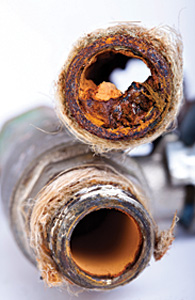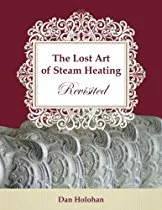Hot water and steam boilers during the summer
Summer, hot water and steam


|
| Photo credit: ©istockphoto.com/Eldad Carin |
Not many people graduate from Harvard at the age of 20 but Theodore Minot (who, understandably, went by T.M.) Clark did. Clark was born in Boston in 1845 — the same year The New York Herald first mentioned a new game called baseball. He went on to be the editor of American Architect magazine and also was in charge of the Department of Architecture at M.I.T. for a good long time.
He wrote several books and served as a director of the Workingman’s Building Association, which helped the poor buy homes so they could have a stake in America. Today, the Workingman’s Building Association is called the Boston Foundation. Clark has been dead for many years but he continues to be a fascinating conversationalist because he left behind delicious books and articles. He continues to share and he really knows his stuff.
I was thinking about how we’ve grown so used to central heating and, with the exception of an occasional cleaning, pretty much ignore our boilers and heating systems when the weather gets hot and sticky. I wondered if it had always been this way and who better to ask than T.M. Clark, the workingman’s architect. So I did.
Dan: Mr. Clark, I’ve been reading your stuff and smiling at how much you know about hot-water and steam heating. These days, most architects leave those mechanical details to the engineers but I know it was different in your time. Did you do anything special with a hot-water boiler during the summertime?
T.M: Well Dan, in leaving a hot-water heating apparatus to take care of itself for the summer, one thing is of great importance — do not change the water. Furnace men and heating contractors generally advise their customers to change the water in every hot-water apparatus at least once a year and “fill them up with nice clean water.” This advice should not be followed for the very good reason that every filling causes renewed rusting and pitting of the inside of the pipe and boiler.
This is avoided by not changing the water.
Dan: It’s funny how some things never change. I’ve met contractors who still make that recommendation, even after nearly 100 years. One guy told me there’s a difference between summer water and winter water and you have to change with the seasons. I asked him why that was. He shook his head sadly and rolled his eyes, as if to say I was stupid for asking.
T.M: He does not know so well as he should, and ordinary people do not know at all, the difference between fresh water and nearly boiling water and its effects on iron pipe. The latter does not rust iron, while the former does.
Unless water is contaminated with chemicals, any affect fresh water may have in rusting iron is due to carbonic acid gas, and perhaps to ordinary air, dissolved in it. All water, by standing, absorbs air and carbonic acid from the atmosphere and becomes corrosive. However, by heating the water nearly to the boiling point, these gases are drawn out again and the water becomes noncorrosive.
Dan: So the black, nasty water in a hot-water system is like fine wine, eh?
T.M: Exactly! In a hot-water heating apparatus, the fresh water first put in loses its corrosive quality as soon as it has been heated. And so long as the same water remains in the pipe and boiler, it continues to be noncorrosive — except during the period of disuse in summer, when the water absorbs air and carbonic acid from the small amount of surface exposed in the expansion tank.
Thus, although the water, after years of use, becomes discolored, the color does it no harm and such water will have no injurious effect on the apparatus. Fresh water, on the other hand, will immediately begin a corrosive action, which will continue until the air in it has exhausted its power for harm.
Tricks of the trade
Dan: These days, we use closed compression tanks, which make things much easier for us. I know you guys used those tanks that were always open to the atmosphere at the tops of your systems. It’s one of the things that made hot-water heating safer than steam heating — an open system won’t explode. But what did you do if you had to drain the system for repair? Didn’t that open the system to further corrosion?
T.M: Well, there’s a right way and a wrong way to open the system. The proper way to do it is: before drawing off the old water, pour a pint or so of oil on the surface of the water in the expansion tank, which is always to be found at the highest point in the system. Lard oil or lubricating oil should be used. Kerosene is of little or no use. After putting on the oil, draw off the water by opening the stopcock at the lowest part of the boiler or other apparatus.
As the water runs out, the oil will follow it down through the pipe and radiators, coating the inside of them with a slight film. The film will protect the pipe and radiators from being attacked by the moist air left in the pipe, a corrosive agent as powerful as fresh water itself. Refill the system through the expansion tank and immediately build a fire in the boiler, no matter what temperature the air in the house may be, so as to boil the air and carbonic acid out of the fresh water.
Dan: You’ll have to watch out for the oil if the boiler has rubber gaskets between its sections. But those gaskets won’t show up until you’re long gone.
T.M: Excuse me?
Dan: Never mind. Hey, before we run out of space here, let me ask you about steam systems and summertime. Should we be treating them the same way we treat hot-water systems and keep using the same boiler water year after year?
T.M: No, steam house-heating systems, unlike hot-water heating systems, should have the water drawn or blown off at the beginning of summer. The small quantity of water in a steam boiler absorbs air and gives off dampness, both of which will corrode the pipe and boiler. In a hot-water apparatus there is little absorption of air and the water, with which the whole system is filled, acts as a protection.
Dan: Well, that certainly got my attention. I know very few people who drain their steam boilers during the summer. Most use the boiler all year for both heating and for making domestic hot water. They turn down the temperature during the summer so the water won’t boil, but now you have me thinking about all the moisture rising up within the piping and mixing with air to create rust all summer long.
Maybe that’s why the water in a steam boiler usually goes from clear to nasty-red during the first week of firing each fall. And that color has folks draining the boiler, which adds more oxygen, which causes more corrosion.
T.M: We knew not to do that in my day.
Dan: Lots to think about here, Mr. Clark. Thanks for taking the time to chat.
T.M: My pleasure! Hardly anyone talks to me anymore.
Dan: The pleasure is all mine. Oh, and just so you know, you’re going to die in 1909. It’s also the year the Red Sox will trade Cy Young to Cleveland.
T.M: Are they out of their minds?
Dan: And when you’re in the grave for 10 years they’re going to trade Babe Ruth to the Yankees.
T.M: Babe who?
Dan: It all works out, though. It’s going to take some time. Sort of like learning this trade.
T.M: Indeed.
HELPFUL LINKS:
Looking for a reprint of this article?
From high-res PDFs to custom plaques, order your copy today!





